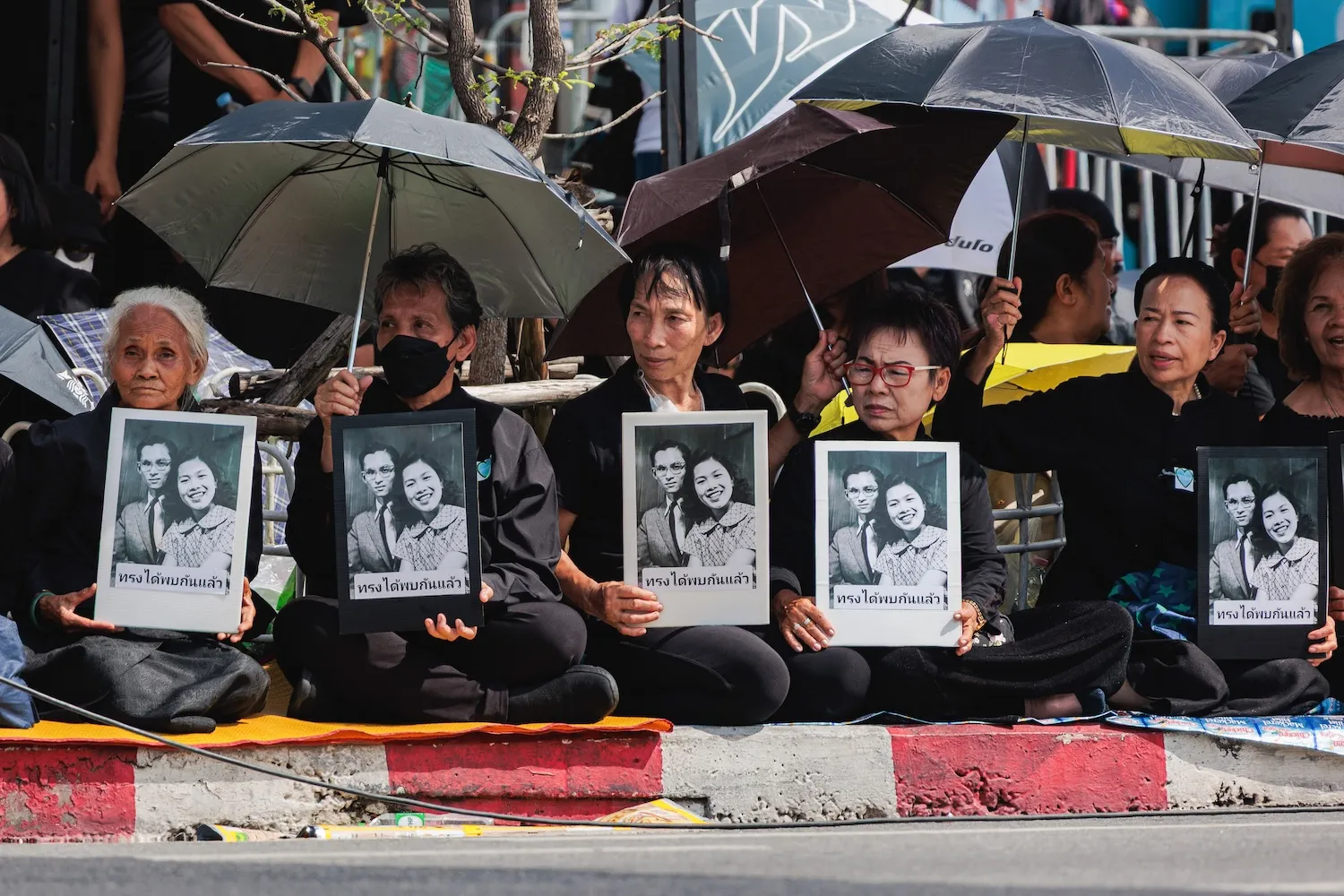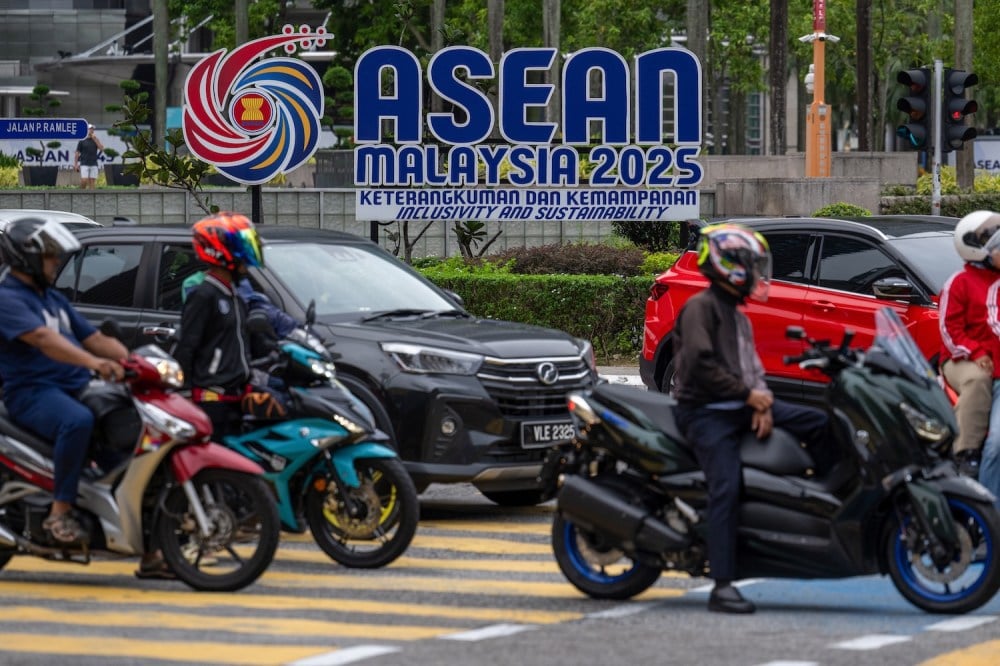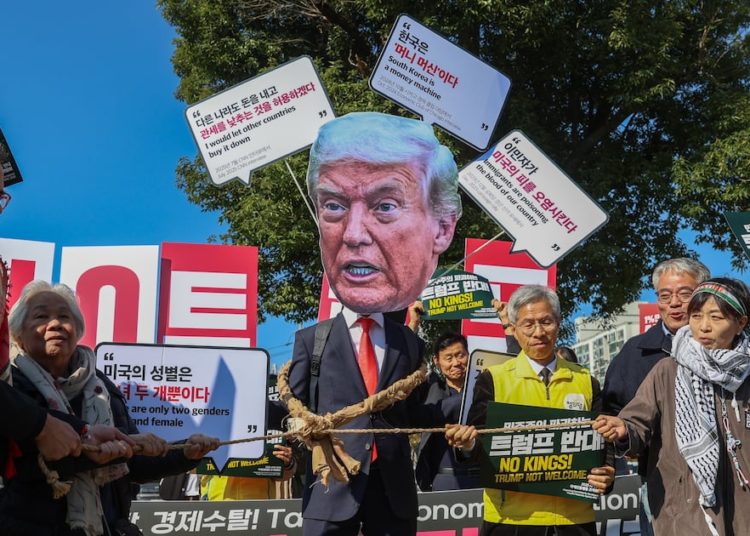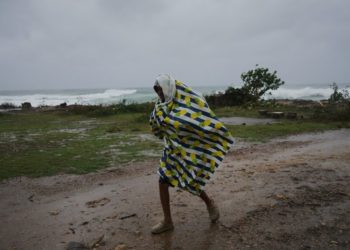Welcome to Foreign Policy’s Southeast Asia Brief.
This week, I’m coming to you from the ASEAN Summit in Kuala Lumpur, where I’ve been haunting the frigidly air-conditioned convention center halls. Highlights of this all-ASEAN edition: the upshot of U.S.-China trade talks on the sidelines, Trump’s photo-op peace deal with Cambodia and Thailand, an awkward gaffe that offended Indonesia, and an interview with the president of ASEAN’s newest member, Timor-Leste.
Mixed Feelings on U.S.-China Talks
Trade talks were, unsurprisingly, the defining feature of this week’s summit of the Association of Southeast Asian Nations (ASEAN) in Kuala Lumpur, Malaysia.
The United States and China’s cautious edging toward de-escalation on the sidelines attracted the most attention—and yielded the outlines of an agreement ahead a planned meeting between U.S. President Donald Trump and Chinese President Xi Jinping in South Korea tomorrow.
China’s sweeping controls on rare earths seem to be on hold for now, as are the United States’ threatened 100 percent retaliatory tariffs.
Other topics discussed included popular video app TikTok, agricultural goods such as soybeans, fentanyl, and port fees on Chinese-made ships.
However, both sides made clear that no final deal was on the table, so much will hinge on the upcoming meeting between Trump and Xi.
What’s the reaction been like from the Southeast Asian side?
Relief, but also trepidation. The first emotion is easy enough to understand. China and the United States are ASEAN’s first- and second-largest trade partners respectively. The trade war has thus put the region in an uncomfortable position.
The United States has pressured countries into reducing ties to China in ways that they feel contradict their interests. And cheap Chinese consumer products that are now locked out of the United States due to higher tariffs are flooding Southeast Asia, squeezing many local manufacturers.
Meanwhile, China’s recent restrictions on rare earths suggest that it, too, is getting ready to deploy trade tools that hurt not just the United States but also other countries.
The trepidation comes from many in ASEAN worrying what might happen if the United States and China get on too well.
Speaking off the record, some sources at the summit outlined their nightmare scenario where China ends up with a better deal than any ASEAN member. It’s not that they necessarily view this is as the most likely possibility. But Trump is unpredictable and clearly very keen for a deal with China—which is not reassuring.
ASEAN members also took advantage of Trump’s presence this week to push forward with their own deals.
The United States, Malaysia, and Cambodia signed deals, while Thailand and Vietnam inked framework agreements with Washington—essentially pathways to final deals.
A few elements of these agreements are worth highlighting.
At a press conference, Malaysian Trade Minister Tengku Zafrul claimed that his country had secured exemptions from the nation’s baseline 19 percent tariffs for 1,711 categories of product, including palm oil, rubber-based products, aircraft components, and pharmaceuticals—equivalent to about 12 percent of the country’s total exports to the United States.
There was no news on semiconductors, which Malaysia produces a lot of, but a deputy minister said that the final deal would take into account the current agreement. The other countries will also get exceptions, but details released here are sparser.
One clause has raised eyebrows. Both Malaysia and Cambodia agreed to “consult with the United States before entering into a new digital trade agreement with another country that jeopardizes essential U.S. interests.”
Zafrul insisted that consultation posed no limit on Malaysian action. But what does this mean in practice?
A likely target seems to be the European Union, with which the United States is wrangling over digital regulations while the EU builds up its own trade links with Southeast Asia.
The European Union is also moving to build ties to ASEAN and was invited to attend the summit for the first time. The EU has been looking to conclude trade talks with Malaysia, the Philippines, and Thailand by 2027, though the EU-ASEAN deal seems to be on the back burner. Europe may be a smaller market than the United States, but as one European official put it to me, “People know when they have a deal with us, it is actually final.”
When Foreign Policy spoke with European Council President António Costa, he was quite clear about the geopolitical component of Europe’s engagement.
“The invitation from ASEAN to the European Union to be present at this summit is a signal that they are different global actors that do not accept this disruption of the multilateral and the rules-based order,” he said.
China also had its moment with ASEAN, signing an upgrade to its trade agreement with the bloc. Like Europe, its pitch is that it is a partner that ASEAN can rely upon, unlike the United States.
What We’re Watching
Thailand-Cambodia’s sort-of peace deal. “You cost me very good entertainment. I could have had a lot of fun,” Trump declared on Sunday, describing how his intervention in Thailand and Cambodia’s short war in July interrupted a day of golfing. Just how important Trump’s intervention was is subject to debate, with one source close to the Thais suggesting that it was key, while some analysts in the United States see Malaysia as having done the heavy lifting. Still, Trump—on the hunt for a Nobel Peace Prize—was keen to take credit, participating alongside the leaders of Thailand, Cambodia, and Malaysia in the signing of the peace deal.
The agreement mainly reiterated points already agreed upon in early September. But to give credit where due, there now actually seems to be some effort toward implementation. Heavy weapons are reportedly being pulled back from the border. Thailand is also under pressure to soon release the 18 Cambodian prisoners of war whom it still has detained.
There are limits, though. Trump may call it a peace deal, but in a press conference, Thai Foreign Minister Sihasak Phuangketkeow simply called it a “pathway for peace.” The agreement included no mention of the fundamental issue—the disagreement over where the Thai-Cambodian border lies. The specter of royal disapproval on this issue sharply limits the Thai government’s ability to actually compromise on borders, sources say.
Who didn’t turn up. As noted last week, this year’s ASEAN summit attracted a lot of world leaders, but not everyone who was anticipated turned up. Russian President Valdimir Putin confirmed at the last minute that he wasn’t coming. Indian Prime Minister Narendra Modi, having arranged to come, ducked out at the last moment. The gossip was that he wanted to avoid Trump. In a mild irony, Modi’s expected presence deterred Pakistan from turning up.
U.S. aircraft crash in South China Sea. A fighter jet and a helicopter based on the aircraft carrier USS Nimitz both crashed into the South China Sea within 30 minutes of each other on Oct. 26. There were no fatalities, with all five persons aboard the craft in a “safe and stable condition,” according to the U.S. Navy. The cause of the crashes is unclear.
At a press conference the next day, a Chinese Foreign Ministry representative said that the Chinese were “willing to provide necessary assistance from a humanitarian perspective,” before criticizing U.S. operations in the South China Sea, arguing that the activities create instability. The first part of the comment is somewhat ironic given China’s steadfast refusal of such help from the Philippines when a Chinese coast guard ship crashed into a Chinese navy ship in August, which was rumored to have caused fatalities.
Quote of the Week
“[W]e share lots of things in common. I was in prison, but you almost got there,” Malaysian Prime Minister Anwar Ibrahim to Trump, jokingly explaining his apparent rapport with the U.S. president.
Gaffe of the Week
As ASEAN leaders were formally introduced for the opening ceremony, the announcer from the Malaysian broadcaster managed a spectacular mess-up, introducing the leaders of Indonesia, Singapore, and Thailand with their predecessors’ names. President Prabowo Subianto was announced as Joko Widodo, Prime Minister Lawrence Wong was introduced as Lee Hsien Loong, and Prime Minister Anutin Charnvirakul was identified as Srettha Thavisin.
Prabowo subsequently left on Monday, cutting his visit short. A source was at pains to tell me that personal apologies from Anwar and the Malaysian foreign minister had smoothed things over and that the early exit was made over domestic issues as well as problems with the hotel.
Photo of the Week

Thailand’s queen mother dies. On Oct. 24, Thailand’s queen mother, Sirikit, died at the age of 93. At age 18, she had married King Bhumibol Adulyadej shortly before his coronation in 1950, despite the poor first impression that he had made on her. “It was hate at first sight,” she recounted in a rare interview with the BBC in 1980, “because he said he would arrive at 4 o’clock in the afternoon. He arrived at 7 o’clock, kept me standing there, practicing curtsy and curtsy.”
Renowned as a style icon in her youth, she also became a political player in her own right, using the prestige of her office to back royalist politicians and movements in the 1990s and 2000s—most notably supporting groups opposed to former Prime Minister Thaksin Shinawatra, who was toppled in a coup in 2006.
Revered by many in Thailand for her charitable works, the queen mother’s death has sparked huge public displays of mourning. Anutin arrived late to the ASEAN summit and left early due to the national mourning. He also ordered price controls on black cloth as Thais rushed to the shops to buy suitably somber clothes.
FP’s Most Read This Week
- Xi May Have Miscalculated on Rare Earths by Alasdair Phillips-Robins
- Canada Shows How to Neutralize Trump’s Trade Attacks by Agathe Demarais
- Is the U.S. Ready for War With China? by Franz-Stefan Gady
In Focus
After a nearly two-decade effort, Timor-Leste is finally a member of ASEAN. But what does it actually mean for this small state of just 1.4 million to join the bloc? President José Ramos-Horta once joked that it was easier to get into heaven than ASEAN. So, when I sat down with the Nobel Peace Prize laureate on Sunday, my first question was what comes next, now that Timor has reached salvation. How will ASEAN help Timor-Leste, and what will the country bring to ASEAN?
“The difference is once you’re in heaven, everything is taken care of for you,” Ramos-Horta noted wryly. Now the hard work begins, he said. “It’s not exactly a workers’ paradise.” He identified one priority as improving Timor’s own domestic governance and economy and hoped that ASEAN could help with this—facilitating scholarships for Timorese students, for instance. Increased investment in tourism, either from companies looking to access ASEAN markets or Organization for Economic Cooperation and Development markets that gave Timor tariff-free status, was another area that he spoke hopefully about.
For ASEAN, the area where Timor-Leste might have the most impact is on the issue of Myanmar. The country’s ASEAN status has sat in limbo since the military took over in a coup in 2021, but some member states are keen to bring it back in from the cold. Meanwhile, Timor, with its own history of struggle, has been vocal on human rights and democracy in Myanmar.
Ramos-Horta himself has a long history of engagement with the country, recounting how in 1994—when, like today, a junta ran the country—he crossed over from Thailand to teach a 10-day course on diplomacy and human rights to students in an area controlled by Karen ethnic militias.
Today, he remains open to engaging with all sides in the name of peace. “We are ready to reappoint an ambassador there,” he said. “I don’t have any objections. With any country in the world … I’m very critical of the way Israel is conducting itself in Gaza and the West Bank. We maintain diplomatic relations with Israel.”
His main hope now is peace—based around cease-fire, a release of political prisoners, and a gradual transition to democracy, however imperfect. “I myself, I’ve become cynical about perfect democracies,” he added.
What of Timor-Leste’s own stability? Worries about the small country’s fragility were a factor behind some ASEAN members’ skepticism about Timor’s suitability for membership. In recent months, Timor—like other ASEAN countries—has seen major demonstrations. The United Nations has also raised worries about international criminal organizations infiltrating the country. And there are questions about the country’s finances if the gas fields that currently provide the lion’s share of state revenues run out before new projects get underway.
On each point, Ramos-Horta was bullish. The demonstrations were “extremely limited” and “inflated on social media,” he said. With the government offering quick and radical concessions, something unusual happened. “The students and the police join hands, dance in the street, celebrating their agreement,” he added.
On crime, he admitted that Timor was “very fragile to attacks from sophisticated organized crime.” However, he added that the government was cracking down and that there was—he insisted—no evidence that any ministers had been involved.
And on the gas fields, he was confident too. He pointed to an independent study that, he said, had vindicated Timor’s long insistence that the large new Sunrise field be piped to Timor, not Australia, for refining.
The post ASEAN’s Mixed Feelings About U.S.-China Detente appeared first on Foreign Policy.




